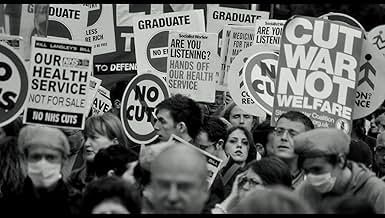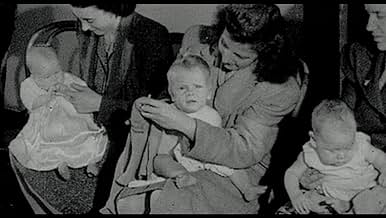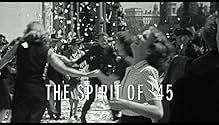IMDb RATING
7.1/10
1.4K
YOUR RATING
A documentary on how the spirit of unity, which buoyed Britain during the war years, carried through to create a vision of a fairer, united society.A documentary on how the spirit of unity, which buoyed Britain during the war years, carried through to create a vision of a fairer, united society.A documentary on how the spirit of unity, which buoyed Britain during the war years, carried through to create a vision of a fairer, united society.
- Awards
- 2 nominations total
Julian Tudor Hart
- Self - General Practitioner
- (as Dr. Julian Tudor Hart)
Harry Keen
- Self - Consultant Physician
- (as Professor Harry Keen)
Jacky Davis
- Self - Consultant Radiologist
- (as Dr. Jacky Davis)
Jonathon Tomlinson
- Self - General Practitioner
- (as Dr. Jonathon Tomlinson)
- Director
- Writer
- All cast & crew
- Production, box office & more at IMDbPro
Featured reviews
"The Spirit of '45" reminds us of the air of progress occurring in British politics immediately after World War II. It takes back to the founding of welfare state and the nationalization of the health service, transport, energy and other areas of public life. The faces we see at the beginning of the film of young Britons celebrating in the fountains at Trafalgar Square symbolize the hope of a nation. But Loach is also worried about the spirit of modern Britain. The second part ponders a different mood than the one of the 1940s: Thatcherism and the more recent failures of organized labor to live up to its founding principles. On the whole this is a tender and humane film, a compelling mix of interviews, with archive footage. The film works all at once as a lament, a celebration and a wake- up call to modern politicians, it's only a bit boring.
Some people have complained that the film is not objective, I think they're missing the point.
The point of this documentary is to capture the essence of that time. What our parents and grandparents had endured and how they faced up to the future with hope for a better world than that passed away with war.
That working together in commonality could build a better world for future generations and they did just that. The achievements of the Atlee government still reverberate down the decades and are with us still.
They did what they did in far harder times than now, are we so useless that we cannot do it?
The point of this documentary is to capture the essence of that time. What our parents and grandparents had endured and how they faced up to the future with hope for a better world than that passed away with war.
That working together in commonality could build a better world for future generations and they did just that. The achievements of the Atlee government still reverberate down the decades and are with us still.
They did what they did in far harder times than now, are we so useless that we cannot do it?
An excellent film in terms of explaining both what the title says, "The Spirit of 1945" leading to the massive victory of the Labour Party in the UK general election of that year and also the roots of that victory. Loach (correctly) goes back to the end of the First World War and how the promises of "A Land fit for Heroes" was betrayed and millions of working men and their families instead spent most of the inter-war years (not just the so-called "Hungry Thirties") living in poverty and destitution. Their children were determined to build a better Britain and, as Loach shows, this feeling was also shared by many people from much wealthier backgrounds as well (in which bodies during the war such as the Army Bureau of Contemporary Affairs also played a significant role). Loach does not shy away from showing the weaknesses of the Labour Government's policies (e.g. very much "top down" and with no trace of the kind of Mitbestimmung which helped to rebuild West German industry in the same period), but he nevertheless paints far too positive a picture of what Attlee's governments actually achieved.
By going straight from this period (1945-51) to the arrival of "the Wicked Witch" (Thatcher) in Downing Street in 1979, he is able to skate right over how much the Labour Government had NOT accomplished and just how rotten much of British industry and society was by the early-/mid-1970s (and which provided the environment in which Thatcher could only have come to power.) The short-sightedness of union leaders, for example, in focusing purely and simply on short-term economic gain for their members and rejecting totally Castle's "In Place of Strife" proposlas plus "holding the public to ransom" on unlimited occasions in the 1960s and 1970s is simply ignored as not fitting in with the polemic.
In conclusion, watch this film to explain why the Labour election landslide happened, but if you want to know "what happened next", watch the 1959 comedy "I'm all right,Jack" as well. For every stalwart nurse and miner shown in Loach's film, there were unfortunately far too many "Fred Kites" leading their unions in the years after Attlee left office as well!
By going straight from this period (1945-51) to the arrival of "the Wicked Witch" (Thatcher) in Downing Street in 1979, he is able to skate right over how much the Labour Government had NOT accomplished and just how rotten much of British industry and society was by the early-/mid-1970s (and which provided the environment in which Thatcher could only have come to power.) The short-sightedness of union leaders, for example, in focusing purely and simply on short-term economic gain for their members and rejecting totally Castle's "In Place of Strife" proposlas plus "holding the public to ransom" on unlimited occasions in the 1960s and 1970s is simply ignored as not fitting in with the polemic.
In conclusion, watch this film to explain why the Labour election landslide happened, but if you want to know "what happened next", watch the 1959 comedy "I'm all right,Jack" as well. For every stalwart nurse and miner shown in Loach's film, there were unfortunately far too many "Fred Kites" leading their unions in the years after Attlee left office as well!
STAR RATING: ***** Saturday Night **** Friday Night *** Friday Morning ** Sunday Night * Monday Morning
Ken Loach has quite a backlog of work as a performance film maker, but his latest work, laying his unashamed socialist leanings firmly on the line, is presented in a documentary format. Loach thrusts us back in time to the immediate post war years, where with a country in ruins and millions sick and injured, there was no shortage of work and so the people had the power, coming together to re-build the country and form one huge powerful united front that let them decide their own fate, all under the thrust of a powerful Labour movement. The real main objective of the movement was not to go back to the appalling poverty of before the war, which nobody noticed and was just accepted by those who lived in it. Flash forward twenty five years or so, to the arrival of Thatcher.
The main trouble, when politics is presented as art, is that you are naturally going to spur on and impress those who agree with you and form the most spiteful critics out of those who think you don't know what you're talking about. Like the most high horsed (but probably best) Michael Moore offering, Ken Loach here bombards us with a presentation of faces, talking heads, if you will, of a mostly much older generation who vividly bring the original socialist movement back to life, and try to paint a portrait of the sort of things that originally spurned it on.
Reminding me of Moore's work a little, as it does, it's all naturally quite one sided and could even be seen as somewhat self indulgent/important, but where Loach gets it right is by managing to make the film's argument so persuasive anyway, genuinely managing to craft a scene where the poor/lower classes generally had no voice and by realizing their combined power, improved things for themselves and their families, only to have it all snatched back from them many years later.
It never feels pretentious in any way. It's just the work of a proud and accomplished director, maybe wearing his heart on his sleeve a little, maybe not being as subtle as he could be, but presenting something made with such insight and, well, spirit you can't help but be impressed anyway. *****
Ken Loach has quite a backlog of work as a performance film maker, but his latest work, laying his unashamed socialist leanings firmly on the line, is presented in a documentary format. Loach thrusts us back in time to the immediate post war years, where with a country in ruins and millions sick and injured, there was no shortage of work and so the people had the power, coming together to re-build the country and form one huge powerful united front that let them decide their own fate, all under the thrust of a powerful Labour movement. The real main objective of the movement was not to go back to the appalling poverty of before the war, which nobody noticed and was just accepted by those who lived in it. Flash forward twenty five years or so, to the arrival of Thatcher.
The main trouble, when politics is presented as art, is that you are naturally going to spur on and impress those who agree with you and form the most spiteful critics out of those who think you don't know what you're talking about. Like the most high horsed (but probably best) Michael Moore offering, Ken Loach here bombards us with a presentation of faces, talking heads, if you will, of a mostly much older generation who vividly bring the original socialist movement back to life, and try to paint a portrait of the sort of things that originally spurned it on.
Reminding me of Moore's work a little, as it does, it's all naturally quite one sided and could even be seen as somewhat self indulgent/important, but where Loach gets it right is by managing to make the film's argument so persuasive anyway, genuinely managing to craft a scene where the poor/lower classes generally had no voice and by realizing their combined power, improved things for themselves and their families, only to have it all snatched back from them many years later.
It never feels pretentious in any way. It's just the work of a proud and accomplished director, maybe wearing his heart on his sleeve a little, maybe not being as subtle as he could be, but presenting something made with such insight and, well, spirit you can't help but be impressed anyway. *****
THE SPIRIT OF 45 goes back to the end of the Second World War to recreate the unique spirit of that era, when it really did seem as if a new order had been set up in Great Britain, one dedicated to everyone working for each other rather than out to make individual profits. Industries were nationalized with the aim of securing viable investment, the National Health Service offered medical care at point of contact for everyone, while the government of the time dedicated itself for everyone rather than simply appealing to rich interests. With the help of archive film plus testimonies from those who were around the period, Ken Loach evokes a unique spirit, one which has not existed either before or after that period.
Within those terms, the film is a nostalgic piece which makes some important points about people's capacity to change things, if they really want to. But unfortunately Loach veers off his theme when he introduces Margaret Thatcher into the proceedings. It is true that she ushered in a new area of capitalism and selling off state industries to the highest bidder, but we have to remember the size of her victories, which suggest that a substantial slice of the working classes actually voted for her, in spite of the fact that she was working against their interests. What the film illustrates above anything else is the limitation of communal activity, especially when voters are swayed by the prospect of increased wealth through private enterprise - for example, by being given the chance to buy their council houses. It might not be ethically fair, especially for those too poor to accomplish this, but people basically think for themselves first and their fellow-citizens later. In a sense we were responsible for creating a capitalist world; Mrs. Thatcher only offered the conditions.
With this in mind, a lot of the second half of THE SPIRIT OF '45 is largely rubbish, the product of a mind that consciously misreads British history and simply blames the government for all of our problems, rather than ourselves. On the other hand I applaud Loach for advocating this view, for it is only by appreciating its limitations that we can understand that we are responsible for our own demise.
Within those terms, the film is a nostalgic piece which makes some important points about people's capacity to change things, if they really want to. But unfortunately Loach veers off his theme when he introduces Margaret Thatcher into the proceedings. It is true that she ushered in a new area of capitalism and selling off state industries to the highest bidder, but we have to remember the size of her victories, which suggest that a substantial slice of the working classes actually voted for her, in spite of the fact that she was working against their interests. What the film illustrates above anything else is the limitation of communal activity, especially when voters are swayed by the prospect of increased wealth through private enterprise - for example, by being given the chance to buy their council houses. It might not be ethically fair, especially for those too poor to accomplish this, but people basically think for themselves first and their fellow-citizens later. In a sense we were responsible for creating a capitalist world; Mrs. Thatcher only offered the conditions.
With this in mind, a lot of the second half of THE SPIRIT OF '45 is largely rubbish, the product of a mind that consciously misreads British history and simply blames the government for all of our problems, rather than ourselves. On the other hand I applaud Loach for advocating this view, for it is only by appreciating its limitations that we can understand that we are responsible for our own demise.
Did you know
- Quotes
Self - General Practitioner: It wasn't only "never again" about war. It was "never again" about that kind of peace where everything was run by rich people for rich people.
- ConnectionsFeatured in Lasciateci fare Vol. 1 (2015)
- How long is The Spirit of '45?Powered by Alexa
Details
- Release date
- Country of origin
- Official sites
- Language
- Also known as
- The Spirit of '45
- Filming locations
- Liverpool, Merseyside, England, UK(archive footage)
- Production companies
- See more company credits at IMDbPro
Box office
- Gross worldwide
- $488,854
- Runtime1 hour 34 minutes
- Color
- Sound mix
Contribute to this page
Suggest an edit or add missing content


















